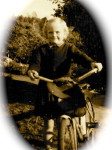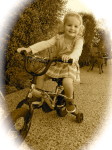As a mother, I see Ed clearly from both sides now
As a mother, I see Ed clearly from both sides now
 My mother began having trouble with me shortly after my 11th birthday. Suddenly her life-loving, sweet, compliant, eager-to-please little girl faded away. I became withdrawn, refused to eat or sit still. To see me running up and down the country roads, refusing to stop, even in the rain, and refusing to eat my favourite foods, even when made to sit at the dinner table for hours, must have been heart-breaking for my mother. I was wasting away, and she felt helpless. She scolded; I retreated. The year was 1962 and Anorexia was unheard of in the Australian farming community in which I lived.
My mother began having trouble with me shortly after my 11th birthday. Suddenly her life-loving, sweet, compliant, eager-to-please little girl faded away. I became withdrawn, refused to eat or sit still. To see me running up and down the country roads, refusing to stop, even in the rain, and refusing to eat my favourite foods, even when made to sit at the dinner table for hours, must have been heart-breaking for my mother. I was wasting away, and she felt helpless. She scolded; I retreated. The year was 1962 and Anorexia was unheard of in the Australian farming community in which I lived.
I can appreciate my mother’s pain now that I am a mother and a grandmother. She did not know that my often embarrassing and shameful behaviour was due to a bully illness entrenching itself in my brain. She did not understand, and I could not explain, that I was terrified to eat, that I felt less anxious if I ate nothing, that I felt guilty if I sat still. The eating disorder wedged itself between my mother and me. In despair and aggravation she said: ‘Why can’t you be like other girls?’. I couldn’t answer. I did not know. Eventually, like a small crack in concrete, the rift of misunderstanding grew, and I became alienated from my parents and sister.
I became known as ‘the one with problems’ in the family. This bothered me greatly. I knew I was ‘me’, but the eating disorder thoughts were mighty powerful and kept me prisoner for more than 40 years.
But I did not give up. Throughout my decades-long imprisonment within an eating disorder, I clung to a desire to regain my identity. I wanted to show my mother that the real me, the little girl that she had known and loved, had not vanished. I was still here, hidden and crying to get free. But by the time I recovered the lost ‘me’ at age 55, Mum had long given up.
I started to write my memoir, A Girl Called Tim, in an attempt to help her understand that the little girl they had ‘lost’ had been suffering an illness, and had ‘returned’. That I was not ‘the one with problems’: I was ‘the one who had an illness’.
Research led me to Claire Vickery, founder of the Butterfly Foundation, and Claire said: ‘June, you need to speak with Daniel Le Grange about Family-Based Treatment’. Would Maudsley Approach pioneer Professor Le Grange at the University of Chicago be interested in speaking with a more than middle-aged survivor of Anorexia from Australia? Tentatively, I sent an email. Soon, I was winging my way to Chicago. The more Professor Le Grange explained Family-Based Treatment, the more I wished this treatment had been around when I was a kid. It may have saved me decades of suffering and my family would still be together.
I put A Girl Called Tim on hold to write My Kid is Back in 2009, hoping to help save families from the distress experienced in mine. I gave a copy to my mother, hoping this would help her understand me. She died in 2010 without commenting. Denial for her and other members of my family of origin had become a way of life. Mum’s death was a relief. I had been already grieving as a lost daughter for years. Now the hopeless hoping for acceptance and love within the family fold could cease. Such is the effect of an eating disorder.
Help your family stay together
I prefer to look forward. I have a daughter and three grand daughters. They, together with my sons and grandsons, are my present and future. I write books and have become involved in eating disorder advocacy and awareness in a bid to help prevent eating disorders destroying more family relationships. We may not be able to stop the development of the illness, but we can help families stay together. Families are not to blame for the development of an eating disorder but neither is the child. However, genetics influence a child’s vulnerability to developing an eating disorder. In battle terms, genes load the gun and environment pulls the trigger. When this happens, the illness affects every member of the family – the sufferer, the parents, the siblings, and extended family too.
Yes, I know what it is like to live with an eating disorder, and I am looking out for my family. The letter below to my first grand daughter, Olivia, was written more than three years ago, on her birth. Today, she is a little girl riding a bicycle with trainer wheels. I like to think of those trainer wheels as providing support until she gets the confidence and skill to ride without them.
People who have eating disorders, and the carers, also need support until they get the confidence and skills to manage the illness and recover. There will be plenty of opportunity to load up on trainer wheels at Australia’s first eating disorder conference for families and carers. See you there – At Home with Eating Disorders!
Letter to Olivia
(Epilogue in A Girl Called Tim)
December 27,2009
Dear Olivia Rose,
(Born December 23, 2009)
Right now you are a sweet wee babe wrapped snug in a rug and bunny suit. By the time you are old enough to read this letter, I picture you as a happy, bubbly little girl hopping from one foot to the other without a care in the world.
Olivia Rose, I will be forever telling you that you are very special and very loved. This is not because you are my first grand daughter, or because you were born on your great-grandmother Anne’s birthday, but because you are you.
I cuddled and kissed you when you were a few hours’ old. You were sound asleep and yet already radiated serenity and self-assurance. Somehow you indicated you are aware of your role in life, and that as you grow up you will quietly and confidently go about fulfilling it. I am sure I felt this as I held you, Olivia Rose. I didn’t only wish it. My heart was filled with gladness.
When I was a little girl, I felt confused and unsure of myself. I enjoyed going to school, and did my best to get top marks but felt upset and cross with myself when I made a mistake. Then, at age 11, an event occurred which made me feel very anxious. I felt alone and scared, Olivia Rose, and an illness called anorexia nervosa developed in my brain.
Back then, there was no family-based treatment like there is today. Untreated, my anorexia became entrenched and evolved into bulimia, together with anxiety and depression, and I took 45 years to escape from that horrible combination of illness. I’m sure you agree that was a very long time to have an illness bossing me around but the important thing is that now I am free, Olivia Rose.
With much help from doctors and loving support from your Grandpa George, your mum Amanda and Uncles Shane, Rohan and Ben, I reclaimed my self and rebuilt my sense of identity.
I have been free for four years now and maintain my health with a simple strategy of attending to feelings as they arise – reaching out for help if I need to — and eating three meals and three snacks a day.
I feel like a bird soaring and swooping with glee in the clear sunny sky – such is the relief of release from the dark cage that was my illness, When I started my recovery journey, I felt scared – like a bird with no wings, about to leave the nest. I dropped to the ground more than a few times but amazingly, the wings developed as I persevered and gradually learnt to trust myself, Now that my wings are strong I am devoted to raising awareness of mental illness. My wish is for children like you to grow up feeling happy and confident, feeling free to achieve your dreams and embracing life to the full.
Olivia Rose, I am glad I persevered, reached out and survived my illness because I am here to enjoy you and our beautiful family. If you ever feel a worry coming on, remember that we are here to listen and to help.
And you might as well get used to it now – as your grandma I will be forever reminding you that to soar like a bird, you must eat three meals and three snacks every day!
Love always, Grandma June







